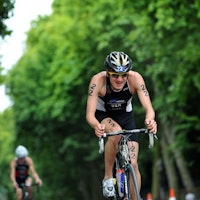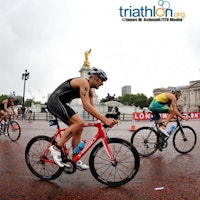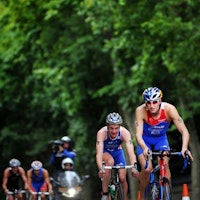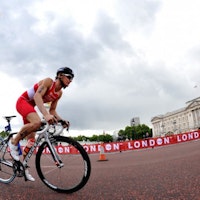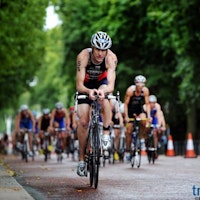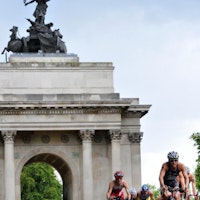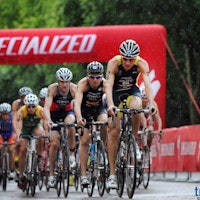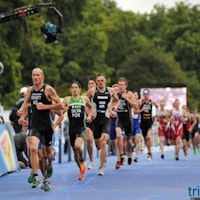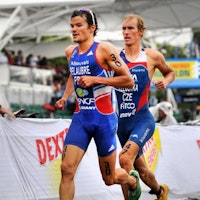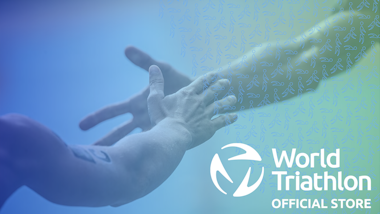The London Olympic rehearsal has been run and won, here's what we learned
08 August, 2011 | español
It was one of the events we looked forward to all year, and the races did not disappoint as Helen Jenkins claimed her first Dextro Energy Triathlon ITU World Championship Series win before Alistair Brownlee capped off a great weekend for Great Britain with an emphatic victory. But as the first and last time athletes were able to race the course before next year’s London Olympics, we thought it might be worth revisiting some statistics, and what the athletes thought of the new Hyde Park course.
The history
It was the weekend that Great Britain fans hoped for, Jenkins wins the women’s and Alistair Brownlee wins the men’s, but they will have to create new history to do it again in London next year. In the previous three Olympic test events for Sydney, Athens and Beijing – the winner of the test event has never won the Olympic gold the next year. Emma Snowsill told Australian press afterwards that “History has proven it’s not a good thing to win so there’s a positive in everything,” Snowsill said. But there is some positive news in the history for Great Britain, in the past two Olympic Games – the bronze medallist from the men’s test event has gone on to win bronze in the Olympic race. Sven Riederer (SUI) in Athens and Bevan Docherty (NZL) in Beijing. That puts Jonathan Brownlee (GBR) in a pretty good place for London 2012. Other test event medallists who have gone on to medal in the Olympic version include Vanessa Fernandes (POR) and Emma Snowsill (AUS). Fernandes beat Snowsill in the Beijing test event, before Snowsill turned the tables in 2008. Also the entire women’s podium from Sydney 2000 had medalled in the test event earlier that year: Brigitte McMahon (SUI), Michellie Jones (AUS), and Magali Dimarco Messmer (SUI)
The Weather
Expect the unexpected is probably an apt motto for an English summer and the men’s race was a perfect example of that. There were patches of sunshine, then cloud, then an almighty downpour. If that happens during the Olympic races next year, it could make things very interesting. Although, Alistair Brownlee is probably hoping it does; the only time he hasn’t won in London is because he had heatstroke and collapsed. “I’ve been looking at the weather forecast most of the week, I didn’t want it too hot as I didn’t want a repeat of last year and when it started raining I thought, yep, no chance of heat exhaustion this year,” Brownlee said afterwards.
The Brownlees brotherly love
They said after the Sydney race to kick off the 2011 season that they didn’t always plan to work together, it just often happened that way. But it was very clear in London that even if they don’t work together, they are always still looking out for each other. Jonathan Brownlee told press that he was careful not to do too much work to help the pack catch his brother on the breakaway, just as Alistair revealed he was getting updates on Jonny during the run and he dropped Brukhankov early to give Jonny a better chance to catch him. That didn’t happen, but Brownlee did run onto the podium, and surely the ability to work together is going to hold them in great stead over the next year. Jonny hasn’t actually qualified yet, but is the best-placed British athlete to take the second spot so far
The Course
The swim
Most swims on the elite series these days are a two-lap affair, but it’s just one long 1500m lap in the Serpentine and it turned out that no one in either the men’s or women’s swim was able to really get away. American Laura Bennett said that it was the hardest part of the course. “The swim was the most difficult, it was hard to get away from everyone. Girls were popping up in the air, when they should be swimming,” she said.

The bike
It has over 100 turns and not really any hills, which means a breakaway was always going to be pretty difficult to obtain. But James Elvery and Alistair Brownlee showed that very thing is possible in London. Brownlee and Alexander Brukhankov showed that it’s worth a podium winning lead. The weather conditions played into their favour as the giant chase pack only lost time with every lap, allowing Brownlee, Elvery, Brukhankov and Ivan Rana to keep increasing the gap to T2. Jonathan Brownlee said afterwards he wasn’t working too hard, as he didn’t want to drag the field up to his brother.
The run
This was the really surprising part of the course, in that it looks fairly flat, but it actually wasn’t. There were lots of little rises and changes of surfaces, which prompted reigning Olympic champion Emma Snowsill to say it was like a high-school cross country course. “I found the run very unrhythmical, on the course these are flat, fast roads. I found this one like a school cross-country, like going over speed bumps, changing direction and speed,” she said. Findlay, whose preparation was hampered with a hip injury said, “I found the run was the most challenging, not only because I’m not running, but there’s lots of changes in direction and changes in surfaces, hills that you do not mind when you are running easy but you do when it’s hard.” Alistair Brownlee, not surprisingly, loved it, “I was quite surprised that the run was good, it had different surfaces and corners and hills and stuff so I quite enjoyed that,” he said.
The Qualifiers
As an automatic qualifying event for plenty of National Federations, it was hard not to catch the Olympic fever in the air. In the men’s race, Alistair Brownlee confirmed his spot on the British team with the win, while David Hauss and Laurent Vidal claimed their places on the French team for 2012 with their respective sixth and seventh finishes. Germany also had automatic qualifying riding on the race and that battle was thrilling, with Steffen Justus, reigning Olympic champ Jan Frodeno and Maik Petzold all starting the run together. In the end Justus ran clear into fifth to secure his place, while Frodeno held off Petzold by just four seconds to gain the second spot. But the real Olympic qualifying surprises came in the women’s race, with American Gwen Jorgensen claiming silver and her spot on the American team. It was only the 25-year old’s third Dextro Energy Triathlon ITU World Championship Series race, but her stellar run leg saw her mow down the field and eventually finish just seven seconds behind Jenkins. Jorgensen recorded an impressive 33 minutes, 43 seconds run split, fastest amongst the women on Saturday. Then there was the woman who came bronze, Anja Dittmer (GER). With that result enough to qualify for the German team, Dittmer became the first triathlete to qualify for four consecutive Olympic Games. After competing in Sydney, Athens and Beijing, Dittmer will head to London next year. Sarah Groff (USA) also qualified with her seventh place finish, which leaves Sarah Haskins and Laura Bennett to battle for that final spot. Andrea Hewitt (NZL) also qualified for her second straight Olympics with her sixth place finish. Swiss veterans Sven Riederer and Nicola Spirig both put themselves into position for another Olympic Games start after fulfilling the first part of Swiss Olympic qualification with top ten finishes. However, both still need “confirmation results” next year with either a top 15 at a WCS or top five at a World Cup or the European Championships. For those National Federations who didn’t qualify athletes in London, Beijing is the next stop.
tags
london 2012 jonathan brownlee helen jenkins gwen jorgensen emma snowsill dextro energy triathlon itu world championship series anja dittmer alistair brownlee
event website
2011 Dextro Energy Triathlon - ITU World Championship Series London
Related articles

Five of the best female triathletes in the world gave hundreds of fans in London an inside look at the 2012 Olympic Games…

Alistair Brownlee showed he is the man to watch at the 2012 Olympics Games, when he rode and then ran away with the London…

Great Britain's Helen Jenkins thrilled both herself and her home crowd with gold in the Olympic preview, and Gwen Jorgensen…

Last week marked a year until the official opening ceremony of London 2012, but today marks 365 days until the next Olympic…

The London Dextro Energy Triathlon Series has a new look about it this year, as the athletes test out the 2012 Olympic course…



